You've heard of the fat suit and the pregnancy suit; now meet AGNES - the old person suit.
AGNES stands for Age Gain Now Empathy System and was designed by researchers at the Massachusetts Institute of Technology's AgeLab to emulate what it feels like to be 75 years old with arthritis and diabetes.
"The business of old age demands new tools," said Joseph Coughlin, director of the AgeLab. "While focus groups and observations and surveys can help you understand what the older consumer needs and wants, young marketers never get that 'Ah ha!' moment of having difficulty opening a jar, or getting in and out of a car. That's what AGNES provides."
Coughlin and his team carefully calibrated the suit to make the wearer just as uncomfortable as an elderly person who has spent a lifetime eating poorly and not doing much exercise.
Special shoes provide a feeling of imbalance, while braces on the knees and elbows limit joint mobility. Gloves give the illusion of decreased strength and mobility in the hands and wrists, and earplugs make it difficult to hear high-pitched sounds and soft tones. A helmet with straps attached to it compresses the spine, and more straps attached to the shoes decrease hamstring flexibility and shorten the wearer's gait.
It's not a pretty picture of aging.
"The three words we associate with wearing AGNES are fatigue, friction and frustration," Coughlin said.
AGNES has been used most recently by a group of students working on a design for an updated walker. By wearing the suit they could see for themselves what design and materials would make the most sense for a physically limited older person. Coughlin said the suit has also been used by clothing companies, car companies and retail goods companies to help them understand the limitations of an older consumer.
If all this is making you terrified of getting older, Coughlin offers a bit of reassurance.
"AGNES is not the destiny of everybody," he said. "She is a badly behaved lady who didn't eat and exercise very well. A secondary benefit we've found with AGNES is that it has become a powerful tool to get younger people to invest in their long-term health."
(c)2012 the Los Angeles Times
Distributed by MCT Information Services






















